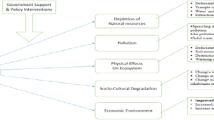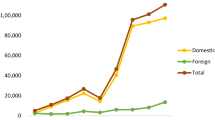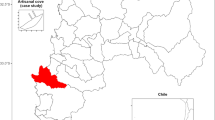Abstract
The sustainable development of the tourism industry does not only involve putting forward new requirements that relate to resource integration and stakeholder profitability, as the attainment of the tourism industry’s sustainable development goals also requires cooperation between different parties. Studies of traditional sustainable tourism supply chain management generally focus on the relationship between two parties, and few consider cases where there is collaboration between three or more stakeholders. In drawing on the nucleolus concept taken from cooperative game theory, this paper applies the network loss allocation method to study cooperation issues in a triadic relationship that involves airlines, tourist attractions and travel agencies. We specifically analyze the costs and benefits of these three different stakeholders in the tourism industry, and we provide numerical calculations and examples to support our analysis.



Similar content being viewed by others
References
Alamdari F (2002) Regional development in airlines and travel agents relationship. J Air Transp Manag 8(5):339–348
Andria J, di Tollo G, Pesenti R (2019) A heuristic fuzzy algorithm for assessing and managing tourism sustainability. Soft Comput. https://doi.org/10.1007/s00500-019-04170-5
Bastakis C, Buhalis D, Butler R (2004) The perception of small and medium sized tourism accommodation providers on the impacts of the tour operators’ power in Eastern Mediterranean. Tour Manag 25(2):151–170
Busse C, Schleper MC, Niu M, Wagner SM (2016) Supplier development for sustainability: contextual barriers in global supply chains. Int J Phys Distr Log 46(5):442–468
Campo S, Yagüe MJ (2007) The formation of the tourist’s loyalty to the tourism distribution channel: how does it affect price discounts? Int J Tour Res 9(6):453–464
Chung KY (2000) Hotel room rate pricing strategy for market share in oligopolistic competition: eight-year longitudinal study of super deluxe hotels in Seoul. Tour Manag 21(2):135–145
Faigle U, Kern W, Kuipers J (2001) On the computation of the nucleolus of a cooperative game. Int J Game Theory 30(1):79–98
Flynn BB, Huo B, Zhao X (2010) The impact of supply chain integration on performance: a contingency and configuration approach. J Oper Manag 28(1):58–71
Garay L, Font X, Pereira-Moliner J (2017) Understanding sustainability behaviour: the relationship between information acquisition, proactivity and performance. Tour Manag 60:418–429
García D, Tugores M (2006) Optimal choice of quality in hotel services. Ann Tour Res 33(2):456–469
Hou D, Driessen T, Sun H (2018) The Shapley value and the nucleolus of service cost savings games as an application of 1-convexity. IMA J Appl Math 80(6):1799–1807
Huo BF, Cao Z, Li SY, Zhao XD (2016) The fit between supply chain internal and external integration. Syst Eng Theory Pract 36(2):363–373
Liang M, Ma R (2018) The game analysis of the tourist shopping process in tourism destination. Chin Stud 7(1):47–58
Mazzeo MJ (2002) Product choice and oligopoly market structure. Rand J Econ 33(2):221–242
Medina-Muñoz D, García-Falcón JM (2000) Successful relationships between hotels and agencies. Ann Tour Res 27(3):737–762
Medina-Muñoz RD, Medina-Muñoz DR, Garcia-Falcón JM (2003) Understanding European tour operators’ control on accommodation companies: an empirical evidence. Tour Manag 24(2):135–147
Moeller T, Dolnicar S, Leisch F (2011) The sustainability-profitability trade-off in tourism: can it be overcome? J Sustain Tour 19(2):155–169
Ng SI, Chia KW, Ho JA, Ramachandran S (2017) Seeking tourism sustainability—a case study of Tioman Island, Malaysia. Tour Manag 58:101–107
Pagell M (2004) Understanding the factors that enable and inhibit the integration of operations, purchasing and logistics. J Oper Manag 22(5):459–487
Parlar M, Sharafali M, Goh M (2019) Optimal control and cooperative game theory based analysis of a by-product synergy system. J Clean Prod 233:731–742
Peng H, Yong H, Xu F (2018) Evolutionary analysis of sustainable tourism. Ann Tour Res 69:76–89
Piga CAG (2003) Territorial planning and tourism development tax. Ann Tour Res 30(4):886–905
Quarshie AM, Salmi A, Leuschner R (2016) Sustainability and corporate social responsibility in supply chains: the state of research in supply chain management and business ethics journals. J Purch Supply Manag 22(2):82–97
Richards P, Font X (2019) Sustainability in the tour operator—ground agent supply chain. J Sustain Tour 27(3):277–291
Schmeidler D (1969) The nucleolus of a characteristic function game. Siam J Appl Math 17(6):1163–1170
Songhuai D, Xinghua Z, Lu M, Hui X (2006) A novel nucleolus-based loss allocation method in bilateral electricity markets. IEEE Trans Power Syst 21(1):28–33
Tapper R (2008) A sustainable supply chain management framework for tour operators. J Sustain Tour 16(3):298–314
Tijs SH, Driessen TSH (1986) Game theory and cost allocation problems. Manag Sci 32(8):1015–1028
Tran X, Thompson C (2015) Application of game theory in tourism. Tour Anal 20(6):697–702
Tsaur S, Yung C, Lin J (2016) The relational behavior between wholesaler and retailer travel agencies: evidence from Taiwan. J Hosp Tour Res 30(3):333–353
UNWTO (2015) Tourism and the sustainable development goals—Journey to 2030 (Vol. 2019)
Veeramsetty V, Chintham V, Vinod Kumar DM (2018) LMP computation at DG buses in radial distribution system. Int. J Energy Sect Manag 12(3):364–385
Yin C, Yong L, Jianyin B (2019) Effect of positional embeddedness on tour supplier integration: Chinese evidence. Sustainability 20(11):5741
Zhang L, Zhang J (2018) Perception of small tourism enterprises in Lao PDR regarding social sustainability under the influence of social network. Tour Manag 69:109–120
Zhang X, Song H, Huang GQ (2009) Tourism supply chain management: a new research agenda. Tour Manag 30(3):345–358
Zhao X, Huo B, Flynn B, Yeung J (2008) The impact of power and relationship commitment on the integration between manufacturers and customers in a supply chain. J Oper Manag 26(3):368–388
Funding
This research was supported by the National Social Science Fund of China (NSSFC) Grand No. 201101191110031 and the Innovative Science Foundation of Chongqing (No. CYB18014).
Author information
Authors and Affiliations
Corresponding author
Ethics declarations
Conflict of interest
The authors declare that they have no conflict of interest.
Ethical approval
This article does not contain any studies with human participants & animals performed by any of the authors.
Additional information
Publisher's Note
Springer Nature remains neutral with regard to jurisdictional claims in published maps and institutional affiliations.
Rights and permissions
About this article
Cite this article
Bai, J., Chen, Y. An analysis of the triadic relationship between airline, destination, and travel agency: applying nucleolus theory to assess power loss and the profit allocation approach. Soft Comput 25, 5881–5893 (2021). https://doi.org/10.1007/s00500-021-05581-z
Published:
Issue Date:
DOI: https://doi.org/10.1007/s00500-021-05581-z




